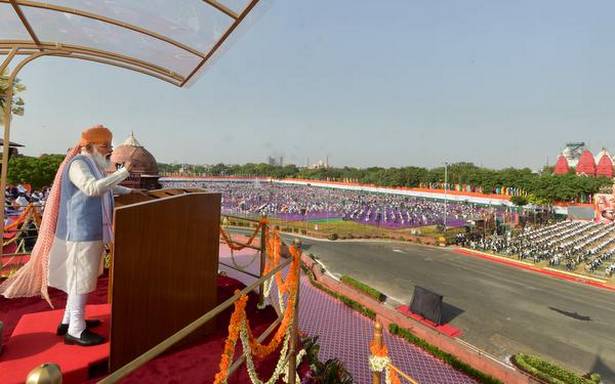‘There comes a time in every nation’s life where it defines anew what development means for it… that moment for our country is now,’ he says.
In his eighth consecutive address to the nation from the ramparts of the Red Fort, Prime Minister Narendra Modi called for making the next 25 years (when India will hit a century of independence) a glorious one with “new thresholds, aspirations and dreams” , coining the phrase “Sabka Saath, Sabka Vikas, Sabka Vishwas, Sabka Prayaas” (With all, development for all, the trust of all, the striving of all). “There comes a time in every nation’s life where it defines anew what development means for it, and resolves anew on how to reach its goals, that moment for our country is now,” he said. He termed the next 25 years as “Amrit Kaal” for achieving of these goals.
The recent second wave of COVID-19 that hit India was also referred to by the Prime Minister who recalled those who passed away and lauded the “untiring and committed” work of doctors, nurses, paramedics, sanitation workers, scientists and entrepreneurs who helped fight the pandemic and assisted by the development of indigenous vaccines. He also mentioned that while celebrating independence, “Indians had taken an emotional decision to mark August 14th as Partition Horrors Remembrance Day” for all those who had lost their lives and loved ones in the Partition of 1947.
His speech, nearly 90 minutes in all, went over the efforts of his government to simplify laws, make government less intrusive, heavy investment in infrastructure, including the ₹100 lakh crore “Gatishakti initiative” the master plan for which would be unveiled soon. He pointed out to India’s commitment to the environment and its climate change goals by stating that the country was committed to “circular economy”, and the new vehicle scrappage policy was part of that as well as the setting up of the National Hydrogen Mission for encouragement of green fuels.
He said his government was committed to the goal of 100% coverage of all welfare schemes, including the Jal Jeevan mission of tapped drinking water connections in all homes, Ujjwala cooking gas scheme, Pradhan Mantri Awaas Yojana for housing, Jan Dhan bank accounts for everyone and other such schemes. He also announced the admission for girls in all Sainik Schools across the country and that the use of fortified rice across all government nutrition programmes would also be undertaken. He said his government had the political will to push through second generation reforms required to jump start the economy. Describing the New Education Policy as a means to fight poverty, he said it would focus on encouraging teaching in regional languages. “No child will be prevented from accessing opportunities just because of medium of instruction, mother tongue will be encouraged,” he said.
Giving the slogan of ‘Chhota kisan bane desh ki shaan (small farmers should become India’s pride)’, Mr. Modi said 80% of India’s farmers had less than two hectares of land.
“Keeping small expenses in mind, the government is implementing the Pradhan Mantri Kisan Samman Nidhi (PM-KISAN) under which more than ₹1.5 lakh crore has been transferred into the bank accounts of over 10 crore farmers,” he added.
Mr. Modi also said reservation was being ensured for Dalits, STs, backwards and general category poor, and emphasised that the hand-holding of deprived communities was necessary.
Fighting terrorism and expansionist tendencies
The nature of international relations, Mr. Modi said, changed after the Second World War and there was a possibility of a new world order in a post-coronavirus pandemic scenario. He said that India was fighting the challenges of terrorism and expansionism with great courage and astuteness. He asserted that India did not hesitate in taking tough decisions and had political will to do so. “India has given a stern signal to its enemies by conducting surgical and air strikes. This tells us that India is changing and can take the most difficult decisions and isn’t reluctant to implement them,” he added.
He had begun his address, hailing the contribution of Mahatma Gandhi, Subhas Chandra Bose, India’s first Prime Minister Jawaharlal Nehru, Sardar Vallabhbhai Patel and B.R. Ambedkar, among others, in nation building. He also lauded India’s Olympic contingent, which was present at the Red Fort, and said their performance encouraged the youth of the country.
He concluded his speech by reciting a poem, ‘Yahi samay hai, sahi samay hai, Bharat ka anmol samay hai (This is the moment, it is the right moment, It is precious time for India)’.
Source: Read Full Article


